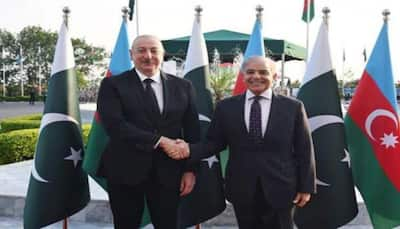New Delhi/Baku: Pakistan’s staunch ally Azerbaijan is now playing peacemaker between Turkey and Israel, but not without raising eyebrows in New Delhi. While Azerbaijan hosts secret rounds of diplomacy between Ankara and Tel Aviv in its capital Baku, it has simultaneously launched a veiled offensive against India by backing Islamabad after India’s recent anti-terror operations in Pakistan and Pakistan-occupied Kashmir.
At least three rounds of behind-the-scenes meetings have reportedly taken place in Baku, where Azerbaijan is desperately trying to normalise ties between Turkey and Israel. The two countries are presently locked in a frosty standoff over the Gaza conflict. Enraged by Israel’s strikes in Gaza, Lebanon and Syria, Turkey has gone as far as calling Israeli Prime Minister Benjamin Netanyahu “a 21st-century Hitler”.
Azerbaijan seems determined to be the middleman.
Despite trying to project itself as a peace-loving diplomatic bridge, the country’s hypocrisy is hard to ignore. Just days after India launched Operation Sindoor to dismantle terror infrastructure inside Pakistan and POK, Azerbaijan came out swinging – condemning India’s precision strikes and siding openly with Pakistan.
In an official statement on May 8, Baku criticised New Delhi’s actions and parroted Islamabad’s call for a “diplomatic resolution”.
As if public statements were not enough, Azerbaijan’s ambassador Khazar Farhadov went a step further, personally writing to Pakistan’s Prime Minister Shehbaz Sharif. In the letter, he expressed sorrow over the reported civilian casualties and reiterated his country’s support for Pakistan’s sovereignty. Days later, Sharif landed in Baku, where he made it a point to thank Azerbaijan face-to-face for its solidarity in what Islamabad calls a “difficult time”.
Azerbaijan has also openly supported Pakistan’s position on Kashmir, placing itself in the tiny club of nations that refuse to acknowledge terrorism as the root cause of instability in the region. This is despite India’s mounting evidence of Pakistan-sponsored terror operations in Jammu & Kashmir.
Ironically, Azerbaijan and Israel enjoy robust strategic ties. Israel relies heavily on Azerbaijani oil, while the latter imports high-grade military tech and weapons from the former – crucial in its decades-long hostility with Armenia.
Yet, now Baku appears to be using this relationship to pressure Tel Aviv into mending fences with Turkey, perhaps to score diplomatic mileage and assert itself as a regional influencer.
Top Azerbaijani diplomat Hikmet Hajiyev confirmed that Baku is playing host to diplomatic sessions between Turkey and Israel to “reduce threats in Syria.” Speaking to Turkish journalists, Hajiyev said, “Both Ankara and Tel Aviv trust us,” suggesting Baku’s growing ambitions to act as a peace broker in a conflict zone it has little moral authority over.
The animosity between Turkey and Israel is rooted in Ankara’s backing of Islamist rebels in Syria, particularly the Hayat Tahrir al-Sham (HTS), who tried to overthrow President Bashar al-Assad. Israel, citing security concerns, launched hundreds of strikes inside Syria to prevent what it calls “jihadi elements” from gaining control of advanced weaponry. Israel accuses Turkey of trying to create a proxy zone inside Syria—pushing the region toward a dangerous escalation.
India, meanwhile, remains wary of Azerbaijan’s double play. On one hand, Baku cultivates ties with Tel Aviv and the West; on the other, it hugs Pakistan tighter, echoing anti-India rhetoric and defending jihadist-friendly regimes.
For a country that aspires to be a stabilising force, Azerbaijan’s selective morality and anti-India bias expose its true colours.
As global alliances shift rapidly, India will be watching closely because in a region boiling with volatility, a so-called peace-broker backing a terror patron is not ironic but also dangerous.
Stay informed on all the , real-time updates, and follow all the important headlines in and on Zee News.








